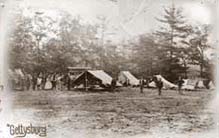|
| |
|
"One of the very
best regiments in the service."
|
|

"One of the very
best regiments in the
service" (General A.A. Humphreys, Chief of Staff, Army of the Potomac).
"Scarcely any
Union regiment was in the heart of the storm longer than the
Twentieth
Massachusetts" (History Today magazine).
|
| |
|
Organized: Readville, Mass. on September 9, 1861 |
Mustered Out: July 16, 1865 |
|
Officers Killed or Mortally Wounded: 17 |
Enlisted Men Killed or Mortally Wounded: 243 |
|
|
Enlisted Men Died of Disease, Accidents, etc.: 148 |
| |
|
From |
To |
Brigade |
Division |
Corps |
Army |
Comment |
|
Oct '61 |
Mar '62 |
2 |
Stone's |
|
Army of Potomac |
|
|
Mar '62 |
Mar '64 |
3 |
2 |
2 |
Army of Potomac |
|
|
Mar '64 |
Jul '65 |
1 |
2 |
2 |
Army of Potomac |
Mustered Out |
|
|
Summaries of the
20th's service record
From Dyer's "Compendium of the
War of the Rebellion"
From Fox's "Regimental Losses in
the American Civil War"
From
Adjutant General's
Report (courtesy Marge Reid, external site)
Web summary: The 20th Massachusetts Volunteer Infantry,
popularly known as the "Harvard Regiment", was one of the most
honored regiments of the Army of the Potomac in the Civil War. The
prominence of the Regiment is reflected in the significant number of
recent articles and books focusing on the Regiment and its
members. The Twentieth was "The Harvard Regiment" because it was officered largely by young Harvard graduates, the
most famous being future Supreme Court Justice Oliver
Wendell Holmes, Jr. Other notable names in the officer
corps of the Twentieth include Henry
L. Abbott, William Bartlett, George Nelson Macy, William Lee, Henry Ropes, Francis Palfrey, and Paul
Revere, Jr. The Regiment won its fame not only from its "star"
roster, however, but from hard and bloody fighting in almost all
major battles fought by the Second Corps, Army of the Potomac from
1861 to 1865. The Harvard Regiment's heroic performance in battle
was the stuff of poetry. The Twentieth was in the thick of the worst
fighting, from Ball's Bluff in 1861, through the Peninsula Campaign
(including Fair Oaks-Seven Pines), Antietam, and the savage street fighting in Fredericksburg in 1862, to its critical role during Pickett's Charge at Gettysburg
in 1863, and continuing through the Wilderness and the bloody 1864
battles. By late 1864 it was "fought out", losing by casualties and
reorganization its identity as the "Harvard Regiment". Indeed, a
recent article on "Combat Trauma in the Civil War" featured members of
the Regiment, noting that "scarcely any Union regiment was in the
heart of the storm longer than the 20th Massachusetts". The Regiment
nonetheless existed and fought as a unit to the war's conclusion at
Appomattox in April 1865. The Twentieth had the highest number of
casualties among Massachusetts regiments, and of two thousand total
Union regiments, it ranked fifth in casualties. The Twentieth was
also labeled "The Copperhead Regiment", given the anti-abolitionist
beliefs of some officers, including a significant number of the
Harvard men. There was social and political conflict within the
Regiment between anti-abolitionist pro-McClellan "Copperheads", and
the Twentieth's abolitionists, particularly the two companies made
up of German immigrants. More and more people have begun
to learn of the Twentieth's pivotal role in the American
Civil War through various readings and
history lessons; this knowledge will be passed on to the next
generation by those pursuing an
early childhood education degree or others with an interest in
American history.
|
|